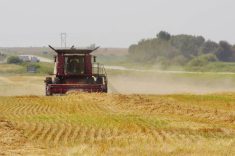New legislation has far-reaching implications
Agriculture, Food and Rural Initiatives Minister Rosann Wowchuk has recently announced that under the new Food Safety Act all food premises in the province of Manitoba will have to be licensed. She wants to start with livestock and move her way down to fruits and veggies. I have read these amendments and am truly disturbed by the far-reaching implications of these changes.
From reading the definition of “food premise” in her proposed Bill 7 it would appear that every house in Manitoba shall one day have to be licensed as a food premise.
Read Also

Tie vote derails canola tariff compensation resolution at MCGA
Manitoba Canola Growers Association members were split on whether to push Ottawa for compensation for losses due to Chinese tariffs.
I am in favour of farms carrying a premise ID but I am not in favour of them being licensed. Farmers are having too many financial problems at present to be expected to pay to be licensed as is being proposed in Bill 7. Further to this I would like you to pay attention to the ambiguity of the wording such as the use of words such as “thing” in definitions.
I am also greatly uncomfortable with the broad definitions for the power inspectors would have such as not needing warrants.
I am also concerned about Bill 2, The Animal Care Act, because of the fact that it again mentions search without warrant. Rabbits are also raised as livestock and they should not be under the same legislation.
Douglas Hillier Ponemah, Man.
Ethics amiss in MP actions
It has been revealed that the RCMP will investigate the alleged misuse of the Canadian Wheat Board’s voters’ list in the recent director elections. Veteran MPs David Anderson, Andrew Scheer, Ed Komarnicki from Saskatchewan and Kevin Sorenson from Alberta joined neophyte Saskatchewan MP Randy Hoback in sending letters to voters encouraging them to vote for candidates that want to shut down the CWB.
The MP letters raise questions of proper conduct on several levels. Did the MPs get access to a voters’ list that is protected for the use of candidates only? Why did the MPs use taxpayers’ money to execute their plan? Are we to expect Conservative MPs to send rural voters letters as to how to vote in the next rural municipality or school board elections?
Apart from the RCMP investigation, there are also questions about a parliamentary code that also appears to have been breached. MPs are not supposed to help their friends become “a director or officer in a corporation, association or trade union.” In one of the letters sent, David Anderson urges voters to cast their ballots for Sam Magnus, a longtime Conservative organizer and friend of Anderson’s. Magnus also campaigned on eliminating farmers’ marketing power by dismantling the CWB, a policy position shared by the federal government.
The MPs’ lack of judgment is compounded by the reaction of voters. Many farmers found the letters to be intrusive, coercive and in incredibly bad form. Voters in the four districts who received the letters endorsed candidates that support a strong CWB.
Now it is up to the RCMP to see if the MPs deserve to get their knuckles rapped. Whatever the outcome, it shows the despicable lengths this government is prepared to go to get what it wants, regardless of what the true stakeholders want.
Wilf Harder Lowe Farm, Man.
Troubling questions raised
I was not surprised by the findings in the Jan. 22 story by Ron Friesen that new research raises troubling questions as researchers verify that crops can absorb livestock antibiotics.
Why should anyone expect anything different? Plants are living things, and after all; if we as humans saturate and contaminate the earth with pollutants that the plants will eventually absorb, we also must be prepared to accept that it is not a practice that does not have consequences.
Such studies have previously been carried out in California, as far back as 2002, and the results were conclusive to the findings reported.
The Canadian Food Inspection Agency has shifted from the “precautionary principle” approach to a “risk management” policy. This alone puts the food, and the consumers, in a state of jeopardy.
Also modern attitudes have classified old-fashioned farm work as dirty and degrading. But in reality, it seems the further farming gets from traditional methods and more into the industrialized agriculture method, the hazards to our health and well-being increase. Maybe it is time for a change.
John Fefchak Virden, Man.
Please forward letters to Manitoba Co-operator, 1666 Dublin Ave., Winnipeg, R3H 0H1 or Fax: 204-954-1422 or e-mail:[email protected](subject: To the editor)













